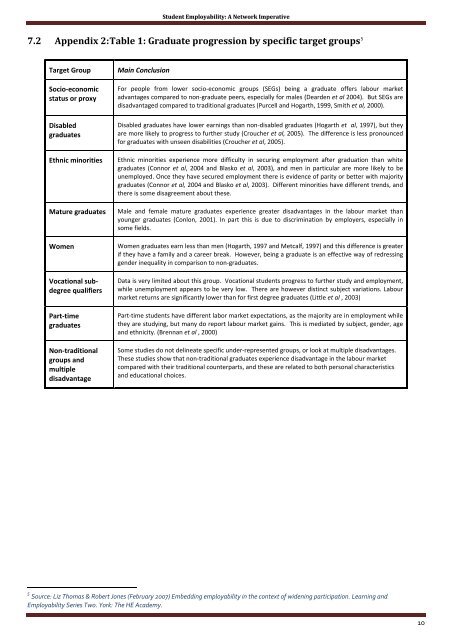Student Employability: A Network Imperative - Birkbeck, University of ...
Student Employability: A Network Imperative - Birkbeck, University of ...
Student Employability: A Network Imperative - Birkbeck, University of ...
Create successful ePaper yourself
Turn your PDF publications into a flip-book with our unique Google optimized e-Paper software.
<strong>Student</strong> <strong>Employability</strong>: A <strong>Network</strong> <strong>Imperative</strong><br />
7.2 Appendix 2: Table 1: Graduate progression by specific target groups 5<br />
Target Group<br />
Socio‐economic<br />
status or proxy<br />
Disabled<br />
graduates<br />
Ethnic minorities<br />
Mature graduates<br />
Women<br />
Vocational subdegree<br />
qualifiers<br />
Part‐time<br />
graduates<br />
Non‐traditional<br />
groups and<br />
multiple<br />
disadvantage<br />
Main Conclusion<br />
For people from lower socio‐economic groups (SEGs) being a graduate <strong>of</strong>fers labour market<br />
advantages compared to non‐graduate peers, especially for males (Dearden et al 2004). But SEGs are<br />
disadvantaged compared to traditional graduates (Purcell and Hogarth, 1999, Smith et al, 2000).<br />
Disabled graduates have lower earnings than non‐disabled graduates (Hogarth et al, 1997), but they<br />
are more likely to progress to further study (Croucher et al, 2005). The difference is less pronounced<br />
for graduates with unseen disabilities (Croucher et al, 2005).<br />
Ethnic minorities experience more difficulty in securing employment after graduation than white<br />
graduates (Connor et al, 2004 and Blasko et al, 2003), and men in particular are more likely to be<br />
unemployed. Once they have secured employment there is evidence <strong>of</strong> parity or better with majority<br />
graduates (Connor et al, 2004 and Blasko et al, 2003). Different minorities have different trends, and<br />
there is some disagreement about these.<br />
Male and female mature graduates experience greater disadvantages in the labour market than<br />
younger graduates (Conlon, 2001). In part this is due to discrimination by employers, especially in<br />
some fields.<br />
Women graduates earn less than men (Hogarth, 1997 and Metcalf, 1997) and this difference is greater<br />
if they have a family and a career break. However, being a graduate is an effective way <strong>of</strong> redressing<br />
gender inequality in comparison to non‐graduates.<br />
Data is very limited about this group. Vocational students progress to further study and employment,<br />
while unemployment appears to be very low. There are however distinct subject variations. Labour<br />
market returns are significantly lower than for first degree graduates (Little et al , 2003)<br />
Part‐time students have different labor market expectations, as the majority are in employment while<br />
they are studying, but many do report labour market gains. This is mediated by subject, gender, age<br />
and ethnicity. (Brennan et al , 2000)<br />
Some studies do not delineate specific under‐represented groups, or look at multiple disadvantages.<br />
These studies show that non‐traditional graduates experience disadvantage in the labour market<br />
compared with their traditional counterparts, and these are related to both personal characteristics<br />
and educational choices.<br />
5 Source: Liz Thomas & Robert Jones (February 2007) Embedding employability in the context <strong>of</strong> widening participation. Learning and<br />
<strong>Employability</strong> Series Two. York: The HE Academy.<br />
10

















